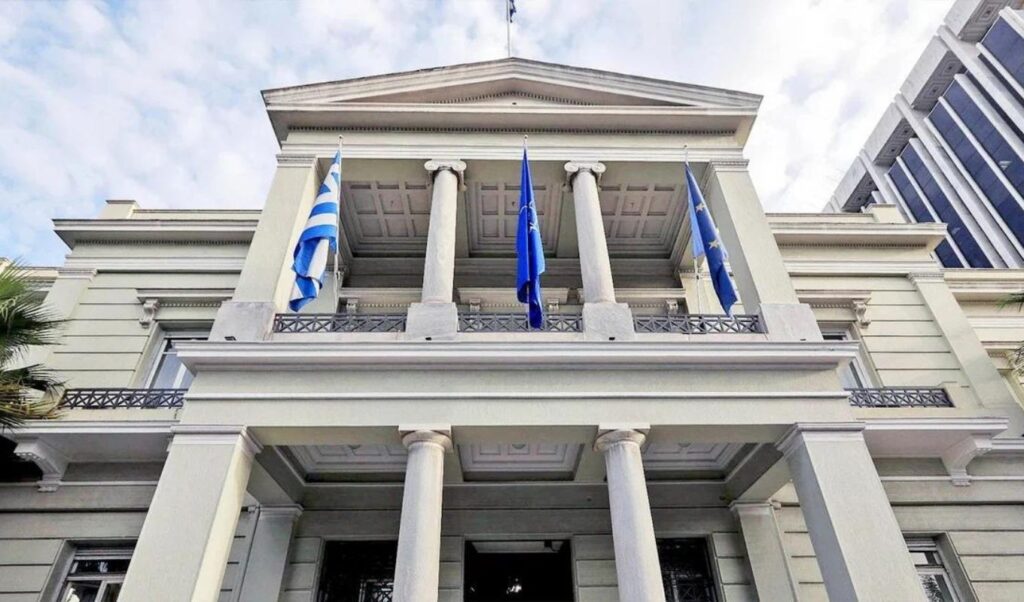Ankara continues its familiar tactics of provocative rhetoric, challenges, and bargaining as it “unfolds” a vast “map” at the diplomatic table stretching from the Eastern Mediterranean to the Middle East, focusing its ambitions on specific fields for exercising political influence and interventions. Ahead of a geopolitically heated autumn for Greek-Turkish relations, Turkish Foreign Minister Hakan Fidan provocatively claimed that in Greece’s domestic politics “issues related to Turkey are the first issues that determine the agenda. It’s like political aspirin. If you have a problem, then bring Turkey, the Mediterranean, the Aegean to the forefront.” In the same sharp tone, he continued: “A theory of dependent reaction has been created.” Athens’ response was immediate, with Greek Foreign and Defense Ministers, as well as the government spokesman, focusing on International Law, the importance of constructive dialogue, and good neighborly relations.
Read: Strict response from Gerapetritis to Fidan: “We don’t accept instructions from anyone”
It’s worth noting that besides the Turkish-Libyan memorandum, which Athens has repeatedly characterized as illegal by issuing a verbal note to the UN, Ankara is building a special cooperation network with both Egypt and Syria. By disputing maritime zones in the Mediterranean and talking about gray areas, Turkey is attempting military cooperation with Cairo and Damascus, and as in Libya’s case, may try to sign memorandums with these countries that challenge other states’ rights.
Turkish provocations: George Gerapetritis’ response
“We don’t accept instructions from anyone” – the Foreign Minister’s response to his Turkish counterpart’s provocative claims was immediate and clear.
Focusing on good neighborly relations and the need for mutual respect, he further emphasized: “Greece has neither phobic syndromes nor defines itself in reference to Turkey. And we don’t accept instructions from anyone. We understand the tension that Greece’s strong and active foreign policy may cause. Let everyone get used to this reality and not turn embarrassment into hostility. Good neighborly relations, which Greece has always pursued, are not promoted through immoderate and untimely statements.”
Dendias’ sharp response
Defense Minister Nikos Dendias gave his response to Turkish Foreign Minister Hakan Fidan’s statements from Copenhagen where he was visiting.
“I am particularly sorry about Fidan’s statements, which I was informed about. Beyond being universally unacceptable and inappropriate, they violate a principle known even to freshman diplomats: the principle of non-interference in other countries’ domestic politics. I am therefore sincerely sorry that this path was chosen,” Dendias said characteristically.
Pavlos Marinakis’ response
Government spokesman Pavlos Marinakis moved along the same lines, referring to Hakan Fidan’s statements targeting Greek politicians. Specifically, the government spokesman said: “Greece will not accept instructions from anyone. It seeks to dialogue with everyone. It will not put sovereignty issues on the scale. Greece is a sovereign state. Greece will continue to strengthen itself and this will continue to happen.”
Hakan Fidan’s provocations
Turkish Foreign Minister Hakan Fidan earlier fired “arrows” at Greek politicians. He specifically mentioned that issues related to Turkey are like “political aspirin” for Greek politicians, as they bring them back to current affairs when they have problems. He also accused them of practicing “cheap politics” by cultivating “anti-Turkish sentiment” among the Greek people, something that “opens the door to crises that can create geostrategic costs” for Greece.
“Unfortunately, in Greece’s domestic politics, issues related to Turkey are the first issues that determine the agenda. It’s like political aspirin. If you have a problem, then bring Turkey, the Mediterranean, the Aegean to the forefront. A theory of dependent reaction has been created. Dependent political reaction has been created. You know this brought Pavlov the Nobel Prize in 1914. With the mention of Turkey, this dependent reaction within Greece’s political scene is an issue that must be resolved in Greek politics,” were Hakan Fidan’s words on Turkish television network TGRT HABER.
“We hope that Greek politics can also reach the maturity and self-confidence of Turkish politics and discuss issues more easily. We don’t hesitate to engage in conflict with them, we don’t hesitate to respond to them. On every issue. But we know what they have done, with which players, what they tried to do, how they attempted to besiege Turkey in the past. We saw these things, took our measures and continue. I advise them to stop the anti-Turkish sentiment. This fear doesn’t benefit them. It leads them to panic. When they have trouble, a statement from Dendias always appears. They constantly show people a Turkish threat. Essentially they don’t say ‘elect me instead of the one opposite.’ This is cheap politics. They engage in such cheap politics, but they shouldn’t open the door to crises that can create geostrategic costs, costs for their own state. For small personal gain, policies and strategic consequences may arise that their own people and state will pay for,” he added.




